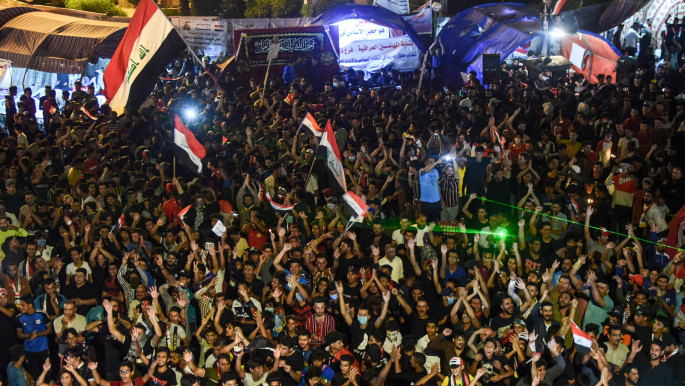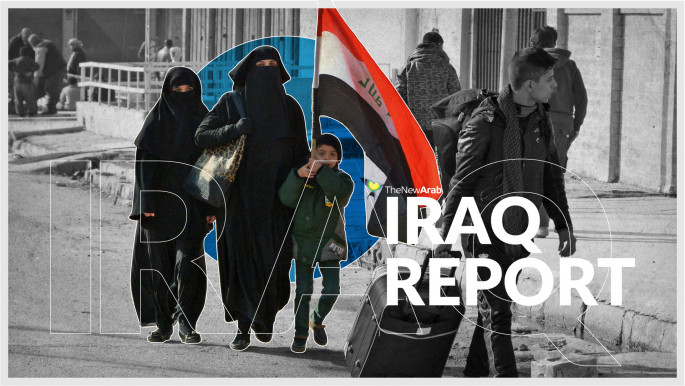The Iraq Report: The prime minister falls but the system remains
The Iraqi parliament accepted the resignation tendered by now former Prime Minister Adel Abdul Mahdi over the weekend, a major indication that the Iraqi authorities have failed to quell rising public anger despite the use of disproportionate force leading to mass casualties.
While accurate figures are difficult to acquire due to government censorship of information, estimates place the number of protesters killed at around 420.
While Abdul Mahdi may have resigned, this is unlikely to satisfy Iraqi demonstrators who have, despite the odds and the violence employed against them, remained on the streets of several major Iraqi cities, including the capital Baghdad.
Protesters have taken significant issue with Iranian control over their country's affairs and are unhappy with the ethnosectarian quotas that have weakened the state and allowed corruption to spread, something demonstrators aim to put an end to.
Iraqi PM resigns as parties jockey for control
The Iraqi parliament formally voted to accept Prime Minister Adel Abdul Mahdi's resignation on Sunday after a massacre of more than 50 protesters in the southern city of Nasiriyah made his position untenable.
Abdul Mahdi's resignation barely a year into his tenure has once more triggered a leadership race, with rival parties jockeying for the top job and already whispers of coalitions forming and ministries being divvied up.
Last year's election majority holders – despite lukewarm turnouts of only 45 percent – have already bowed out of the process. The Sairoun bloc led by Shia cleric and former militia commander Moqtada al-Sadr have announced that they will not nominate any candidate for prime minister and will instead support the protesters in "attaining their legitimate demands".
The influence of the Shia clergy on Iraqi politics is by now undeniable. Not only was Sadr part and parcel of the political system and even the government that he is now denouncing, but even Abdul Mahdi's resignation came in the wake of a damning sermon issued on behalf of Grand Ayatollah Ali Sistani, Shia Islam's most senior authority based in Najaf.
 |
|
| Anti-government protesters gathered in Nasiriyah [Getty] |
A day after protesters were slaughtered in Nasiriyah, Sistani's Friday sermon denounced the violence and directly called on parliament to withdraw its support for the present government and cabinet and to replace them.
Shortly thereafter, Abdul Mahdi – himself a staunch Shia Islamist with close ties to Iran – declared that, based on Sistani's sermon, he would be tendering his resignation. In other words, it was not the deaths of the protesters themselves that triggered his departure but a statement issued by a reclusive yet powerful religious figure.
While some have praised Sistani for seemingly standing by the demonstrators, what is not commonly understood is that the Iranian-born cleric wields significant, and unelected, political control in Iraq.
Clearly, this is untenable in a democracy, and the intrareligious feuds between the Iraq-based seminaries with their Iranian counterparts often means that his influence and the tug-of-war between the two catch normal Iraqis in the middle.
While it is undoubtedly a case that Iran's influence is dominant, that does not mean that there are not other players who have contributed to Iraq's current predicament that has its roots in the ethnosectarian divisions imposed upon Iraqis since the illegal US-led invasion of 2003.
Protesters rage about sectarian system
Protesters have made it very clear that the prime minister's resignation is far from being enough, and have taken aim at a number of significant issues that have been plaguing Iraqis for close to 17 years.
High up on that list is the muhasasa system, the ethnosectarian division of power that apportions different high offices of state to the three main demographics – namely, the Shia, the Sunnis, and the Kurds.
The system is intrinsically illogical as it combines ethnic and religious segregation. For example, the vast majority of Kurds are actually Sunnis, and the Shia and Sunni subdivisions also include Turkmens, Kurds, Arabs, and other ethnic groups. It is therefore viewed as a system designed to divide Iraq into competing and conflicting spheres of influence.
The muhasasa system also ensures that a politically and personally corrupt elite who have a vested interest in the apportionment of various ministries and their budgets stay in control and, more importantly, at each other’s throats.
This has essentially borne out a series of at once ineffectual, authoritarian, corrupt, and weak governments who cannot carry out a legislative agenda due to the heavily fractured legislature that is systemically set up to ensure no one gets a majority.
The roots of this system actually date back to the early 1990s where a loosely based coalition of political parties, Shia, Sunni and Kurdish, met under American auspices to decide what a post-Saddam Hussein political system might look like. It was then implemented to devastating and tragic effect following the Iraq war in 2003.
These same parties became the main players in the post-invasion order and were tacitly and expressly supported by religious figures like Sistani, allowing corrupt politicians to hide behind the clergy as a shield against criticism of their excesses.
Primarily, however, such weak and divided governments have proven to be highly susceptible to foreign influence from the United States and especially Iran.
Iranian control a significant gripe
Iran is the principle player in Iraqi politics today, leading demonstrators to express their fury at their country having so little sovereignty as to have no say in its own affairs.
Since the outbreak of large-scale protests at the start of October, Iraqi protesters – who are mainly from the Shia Arab demographic – have repeatedly expressed outrage at the extent of Iran's control over their country.
Pro-Iran militias were reported in October as having deployed snipers on the rooftops of buildings in several cities to target and kill demonstrators, according to Reuters.
The rapid deployment of proxies serving at the pleasure of Iran's Islamic Revolutionary Guard Corps (IRGC) suggests that Tehran fears what might happen if Iraqi Shias decide they have had enough of being ruled from a foreign capital.
However, the excessive use of violence that has led to the deaths of at least 420 protesters over the past two months alone – and that figure could be a lot higher – has not forced Iraqis back into their homes. In fact, it has encouraged them to stand their ground and in some cases to express their anger in other ways.
Iran's consulate in Najaf was set ablaze last week and again on Sunday, indicating that demonstrators understood that, as much as their own corrupt politicians are responsible, ultimately they were following the agenda of neighbouring Iran whose behaviour has been described as being that of an "imperialist power".
It is highly unlikely that Iran will cede control of Iraq simply to appease the democratic aspirations of the protest movement, but will in fact double down on its investments. After all, Iranian control over Iraqi affairs has allowed it to dominate a crescent of influence stretching from Tehran, to Baghdad, Damascus, and finally Beirut.
Should Iran lose Iraq, it would mark a devastating blow to its regional ambitions.
As a result, the more that Iran and its proxies use violence to quell protests in Iraq, the more Iraqis will resent their eastern neighbour. Even if Tehran and its allies in Baghdad succeed in crushing the demonstrations, the cost will be unforgettable to Iraqis who will seek to oust the influence of a country they deem to be a coloniser.
The Iraq Report is a fortnightly feature at The New Arab.
Click below to see the full archive.
 |





 Follow the Middle East's top stories in English at The New Arab on Google News
Follow the Middle East's top stories in English at The New Arab on Google News


